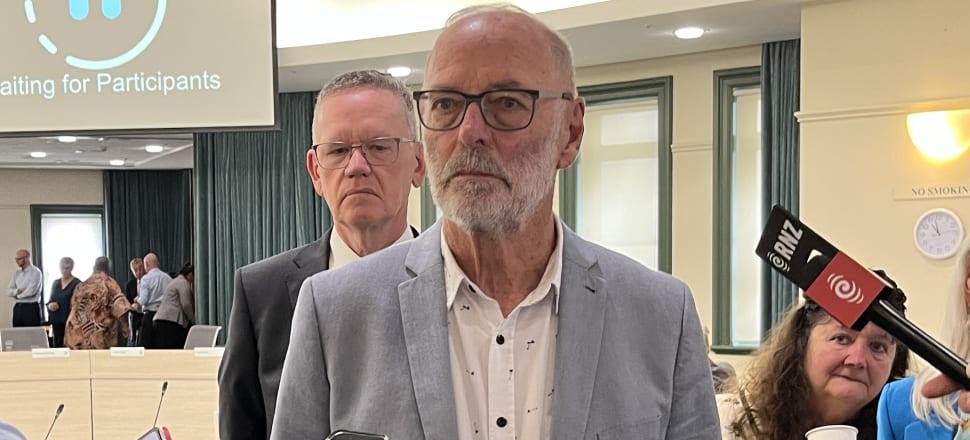
In a manifesto sent to all major political parties, Auckland Mayor Wayne Brown said the ‘engine room of New Zealand’ should plan itself
Auckland Mayor Wayne Brown is asking the major players in central government to commit to a long-term and wide-spanning deal giving the region more autonomy.
The Auckland Deal covers major infrastructure decisions for the region like housing, transport and water services, but also calls for a “fundamentally different relationship” between Auckland Council and central government, based on “mutual respect and alignment of goals”.
READ MORE:
* Councillors livid at surprise housing directive
* Government pulls a u-turn on housing directive
Auckland’s relationship with Wellington has been a real thorn in Brown’s side, especially following moves like a directive earlier this year from Ministers Megan Woods and David Parker calling on Kāinga Ora to investigate development opportunities along the light rail corridor.
The work has now been delayed, and the substantial ire of councillors who said they hadn’t been adequately consulted seems to have played a significant part in that.
At the time, Brown called the directive a “bombing run”.
“This is not how you deal with the biggest city in New Zealand,” he said at the time.
So how do you deal with the biggest city in New Zealand? Brown’s vision of that has been made exceedingly clear in the 15-page document he has now sent to whomever will be elected next month.
His manifesto asks the next government to provide legislative changes allowing Auckland Council flexibility on things like bringing in bed taxes, as well as asking government to shoulder more of the funding burden of services like the Citizens Advice Bureau.
Brown said he can’t fulfil his electoral promise of “fixing Auckland” unless Wellington moves out of the way.
“Wellington needs to stop planning Auckland; let us do the work we are tasked with. We are a regional government; we should be able to deliver for the region.”
It speaks to one of the central issues Brown has had with Auckland’s treatment since he took the mayoral chains nearly a year ago.
He has long held that Auckland is a unique beast in the ecosystem of local councils and territorial authorities, more akin to the state governments of Australia then the local council of a small town in provincial New Zealand.
That was also his rationale for Auckland leaving Local Government New Zealand behind.
“We’re not like Local Government New Zealand,” Brown told Jack Tame on Q+A over the weekend. “But being in there allows them to treat us like Horowhenua or somewhere like that, we are set up to be different, we were set up in partnership.”
Brown said the supercity was set up so the government could negotiate with a significant chunk of its population via the council.
The Royal Commission on Auckland Governance back in 2007 outlined Auckland Council’s relationship with central government would be a key factor in its success.
“Central government needs to have Auckland’s priorities presented to it in an accurate and consistent way,” the report reads. “It also needs to have confidence in the ability of the Auckland Council to make good decisions and to deliver in an effective and efficient way.”
The report also recommended the creation of a Minister for Auckland in order to keep the relationship close.
At the time, Judith Tizard was the Minister for Auckland Issues under the Clark government, but it's a role that vanished for more than a decade following.
It was only reinstated by Prime Minister Chris Hipkins in February of this year, following the severe weather events of the Auckland Anniversary weekend.
But even with Michael Wood and now Carmel Sepuloni tasked with keeping the relationship between the Crown and Brown fruitful, the mayor is not happy.
When asked by Tame if Auckland Council was competent enough to handle the autonomy he was asking for, Brown was very clear: “The bigger question – is Wellington sufficiently competent? No!”
Brown compared the funding Auckland receives from central government to the set-up that state governments in Australia enjoy.
In Australia, states receive 45 percent of their revenue from federal government, while for Auckland the figure is more like 12 percent.
Brown said an “ever-growing list of unfunded mandates” had left Auckland Council hamstrung and unable to move forward.
But while Brown is trying to make a deal, Chris Hipkins and Prime Minister hopeful Christopher Luxon are preparing for the first leaders' debate tonight.
The value of the so-called Auckland Deal will depend on how amenable those two men are to shaking the outstretched hand of Wayne Brown.








